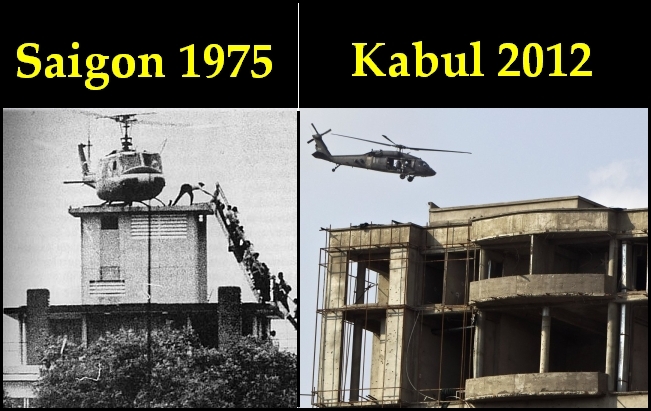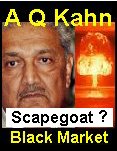- WMR
 WayneMadsenReport April 24-26, 2015 -- A tale of two Jewish-Americans killed in a U.S. drone strike WayneMadsenReport April 24-26, 2015 -- A tale of two Jewish-Americans killed in a U.S. drone strike
On April 23, President Obama made the startling announcement that three U.S. citizens, Warren Weinstein, a Jewish-American contractor for the ever-suspicious U.S. Agency for International Development (USAID); frequent Al Qaeda spokesman Adam Gadahn (Pearlman), a Jewish convert to Christianity and then to Islam; along with a Muslim-American Al Qaeda leader named Ahmed Farouq, were killed in a January 2015 U.S. drone strike launched against an Al Qaeda compound on the Afghan-Pakistani border in North Waziristan. Obama did not say whether the deaths resulted from one or more operations, although it was revealed that two drone strikes were launched against suspected Al Qaeda targets in January. The White House issued a statement saying, "neither [Gadahn/Pearlman and Farouq] was specifically targeted, and we did not have information indicating their presence at the sites of these operations." Obama admitted that the information on the January deaths of the three Americans was classified until he decided to release the news of the operation or operations that killed them.
USAID contractor Warren Weinstein, a fluent Urdu speaker from Rockville, Maryland, worked for J. E. Austin Associates, Inc. of Arlington, Virginia. Little is known about the firm, which chose not to make any public statement upon Obama informing the nation that Weinstein, along with Italian aid worker Giovanni Lo Porto, were accidentally killed in the U.S. strike. Weinstein was taken captive from his Lahore compound on August 13, 2011, four days prior to his return to the United States. Weinstein's capture came two years after Alan Gross, a fellow Maryland Jewish contractor for USAID, Alan Gross, was arrested and imprisoned in Cuba for carrying out espionage associate with installing an Internet system for Cuba's Jewish community. Gross, who lived in Potomac, Maryland, worked for Development Alternatives, Inc. of Bethesda, a USAID contractor, about which, as is the case with J. E. Austin Associates, relatively little is known. Both firms are believed to have connections to the Central Intelligence Agency.
Weinstein's widow criticized the U.S. government for failing to keep hostages' families informed about the status of kidnapped Americans. In a Christmas 2013 video, Weinstein made a direct appeal to Obama for his release: "Nine years ago, I came to Pakistan to help my government, and I did so at a time when most Americans would not come here. And now, when I need my government, it seems that I have been totally abandoned . . ."
For Weinstein to have ended up in captivity with Gadahn/Pearlman must have seemed surreal. Weinstein, a former Peace Corps volunteer in Togo and Ivory Coast may have had contact with Gadahn, who was termed the chief propagandist for Al Qaeda. As reported by WMR on September 9, 2007, many of the videotaped speeches of Osama Bin Laden were written by Gadahn. Los Angeles native Gadahn was born Adam Pearlman, (aka Azzam the American), and ultimately became the number three man in charge of Al Qaeda. Gadahn/Pearlman's grandfather, Carl K. Pearlman, was a member of the board of the Anti Defamation League (ADL), an important component of the Israeli Lobby in the United States.
The man purported to be Osama Bin Laden [left] with his cable TV remote shortly before U.S. forces shot him to death in a raid in Pakistan. Weinstein [right] in December 2013 videotape appeal to Obama for his release. "Bin Laden" and Weinstein apparently had the same taste in hats.
Carl Pearlman, a prominent California urologist, was also the chairman of the Orange County, California "Bonds for Israel" campaign and the United Jewish Welfare Fund.
Curiously, a list of Al Qaeda officials published by the United Nations in 2007, omitted Gadahn/Pearlman from the roster even though he was then considered the number three man in charge of the terrorist group.
A number of purported Bin Laden video and audio tapes, with some of the videotapes showing an almost motionless Bin Laden, were, according to U.S. intelligence sources written entirely by Gadahn/Pearlman. The tapes were exclusively provided to the corporate media by the Search for International Terrorist Entities (SITE) Institute, a Washington, DC-based research institute with links to Israeli intelligence.
The classic "fly on the wall" may have heard some interesting conversations between Weinstein, the Urdu-speaking aid worker who dressed in Pakistani garb, and Gadahn/Pearlman, the Jewish convert to Wahhabist Islam who served as Bin Laden's main speechwriter. Although the White House is indicating Gadahn/Pearlman was killed in a drone attack, there have been reports in the past about his death following U.S. attacks. Nevertheless, what Gadahn/Pearlman may have told Weinstein about 9/11, the alleged Bin Laden "death" inAbbottabad, and Gadahn/Pearlman's connections with SITE may have resulted in a decision by America's chief drone attack official, the CIA's John Brennan, to eliminate all three Americans lest some unsavory information end up in the public domain.
-
Bob
Woodward, book, The War Within: A Secret White House
History 2006-2008, According to Simon & Schuster, Woodward's
book "takes readers deep inside the White House, the Pentagon,
the State Department, the intelligence agencies and the U.S.
military headquarters in Iraq. .... traces the
internal debates, tensions and critical turning points in the Iraq
War during an extraordinary two-year period" ...
release date: Sept 8, 2008, Robert "Bob"
Upshur Woodward, assistant managing editor, Washington Post,
investigative reporter, ... Carl Bernstein, search terms: uncover
Watergate, Nixon, resignation, 12 best-selling books, Pulitzer
Prize, served in the Navy as an aid to Chief of Naval Operations,
Moorer, met Mark Felt, FBI Assistant Director, deepthroat, inside
source on Watergate, book 'The Secret Man', DNC convention,
1972, wrote All the President's Men, Redford Hoffman movie, Ben
Bradlee, editor, reporting on 'Nixon dirty tricks, Woodward
interviewed Bush 43 four times, books: Bush at War, Plan of
Attack, State of Denial: Bush at War, Part III, with Dan Balz,
Camp David, Worldwide Attack Matrix, too close to Bush, Kerry,
involvement in Plame scandal: deposition to Fitzpatrick, told him
senior administration official leaked Plame identity to him in June
2003, November 2005 article revealed his special knowledge, casual,
offhand by Armitage, part of confidential conversation of a
'source', asked Libby questions about Armitage, interview on CNN
Larry King, junkyard dog prosecutor, consequences of Plame outing
not that great, Downie, inaccuracies, inconsistencies,
exaggerations, fabrications in books: John Dean and Ed Gray: Felt
not the only deepthroat, also Donald Santarelli. Brad DeLong: in Maestro
and The Agenda, The Choice, Clinton Whitewater
inconsistencies, abandon critical inquiry to maintain access to
high-profile actors, for glory, stenographer to the rich and
powerful, At the Eye of the Storm, see Maureen Dowd, and The
Brethren, and his sitting on information for publication of a
book, The Commanders ...Powell opposed Operation Desert
Storm, published after war voted for in Congress, and Veil
he did not reveal that William Casey knew of arms sales to the
Contras until after the investigations, and see Martin Dardis ...
Watergate burglars, and Committee to Re-elect the President, ...and
accused of fabricating deathbead interview with Casey, ... Reagan
called him a liar, for whatever that's worth, and other books: Wired,
Shadow,
Aug 19: buzz: likely to propel
re-examination of the Iraq War into the headlines, for fall
presidential campaign, Hadley encouraged participation, interviews
with Bush, Cheney, Rice, Gates, ... publisher: Simon & Schuster,
Amazon, Alice Mayhew, and see CBS, Viacom, 496 pages, 900,000, red,
white, blue, gold cover, administration infighting, will be best
seller, he'll be on 60 minutes, Sept 7, How does Woodward,
Miller, Cheney, Libby fit with declassifying classified information
to hype the war?.. Woodward was leaked Plame info in June 03, but
sat on it for years, ... John Bolton, Marc Grossman are the neo-con
links to Turkey, and Plame / Edmonds working on uncovering WMD
proliferation, black market activities of Bushco.
Seymour Hersh, on Chain of Command
NYTimes "We now have two major accounts of the road
to war in Iraq, Hersh's ''Chain of Command'' and Bob Woodward's
''Plan of Attack.'' Hersh is the anti-Woodward. Woodward is official
scribe to the inner sanctum, and his access -- to Bush, Cheney,
Rumsfeld and Powell -- gives his account real authority, but at a
price. In Woodward's world, everything is what the principals say it
is. In Hersh's world, by contrast, nothing the policy elites say is
true actually is.
SourceWatch
Lt. Gen. David H. Petraeus is "the top American military
commander in Iraq, part of a broad revamping of the military team
that will carry out the administration's new Iraq 'surge'
strategy." [1][2] Petraeus replaced Gen. George W. Casey, Jr.,
who was confirmed February 6, 2007, by the U.S. Senate, as Army
Chief of Staff. ... Petraeus, who has
"served two previous tours in Iraq", "sees the need
for additional troops in Baghdad." He "helped oversee the
drafting of the military’s comprehensive new"
Counterinsurgency Field Manual published December 2006.
[3] ... On September 8, 2005, Lt. Gen.
Petraeus left Iraq "after handing off command" of the
Multi-National Security Transition Command-Iraq, which he had
commanded for 15 months. [4] He most recently served as Commander of
the U.S. Army Combine Arms Center at Fort Leavenworth, Kansas. [5]
New
York Sun Aug 26 ".... speculation is surging that it
will portray the latest phase of the war in Iraq as a success,
credited to the recently departed commander of forces there, General
David Petraeus. ... one source
familiar with an early draft said Mr. Woodward had extensive access
to General Petraeus and his deputies, known in the military as the
"Jedi Council." Mr. Woodward also interviewed the head of
the Anbar Awakening, Sheik Ahmad al-Rishawi, who took over the Sunni
Arab uprising against Al Qaeda in Iraq after his brother was
assassinated last September."
Examiner
"Woodward is also known for his Pulitzer Prize -winning
reporting with fellow Washington Post writer Carl Bernstein . In the
1970s, they collaborated on the groundbreaking stories of the
Watergate scandal that helped bring down Richard Nixon and on
two best sellers about the Nixon administration, "All the
President's Men" and "The Final Days." he can
pry the facts from the most unlikely sources.
|
- ThinkProgress 10 things Republicans won't tell you about Ronald
Reagan. 1. Reagan was a serial tax raiser. As governor of
California, Reagan “signed into law the largest tax increase in the
history of any state up till then.” Meanwhile, state spending nearly
doubled. As president, Reagan “raised taxes in seven of his eight years
in office,” including four times in just two years. As former GOP
Senator Alan Simpson, who called Reagan “a dear friend,” told NPR,
“Ronald Reagan raised taxes 11 times in his administration — I was
there.” “Reagan was never afraid to raise taxes,” said historian Douglas
Brinkley, who edited Reagan’s memoir. Reagan the anti-tax zealot is
“false mythology,” Brinkley said.
2. Reagan nearly tripled the federal budget deficit. During the
Reagan years, the debt increased to nearly $3 trillion, “roughly three
times as much as the first 80 years of the century had done altogether.”
Reagan enacted a major tax cut his first year in office and government
revenue dropped off precipitously. Despite the conservative myth that
tax cuts somehow increase revenue, the government went deeper into debt
and Reagan had to raise taxes just a year after he enacted his tax cut.
Despite ten more tax hikes on everything from gasoline to corporate
income, Reagan was never able to get the deficit under control.
3. Unemployment soared after Reagan’s 1981 tax cuts. Unemployment
jumped to 10.8 percent after Reagan enacted his much-touted tax cut, and
it took years for the rate to get back down to its previous level.
Meanwhile, income inequality exploded. Despite the myth that Reagan
presided over an era of unmatched economic boom for all Americans,
Reagan disproportionately taxed the poor and middle class, but the
economic growth of the 1980′s did little help them. “Since 1980, median
household income has risen only 30 percent, adjusted for inflation,
while average incomes at the top have tripled or quadrupled,” the New
York Times’ David Leonhardt noted.
4. Reagan grew the size of the federal government tremendously.
Reagan promised “to move boldly, decisively, and quickly to control the
runaway growth of federal spending,” but federal spending “ballooned”
under Reagan. He bailed out Social Security in 1983 after attempting to
privatize it, and set up a progressive taxation system to keep it funded
into the future. He promised to cut government agencies like the
Department of Energy and Education but ended up adding one of the
largest — the Department of Veterans’ Affairs, which today has a budget
of nearly $90 billion and close to 300,000 employees. He also hiked
defense spending by over $100 billion a year to a level not seen since
the height of the Vietnam war.
5. Reagan did little to fight a woman’s right to chose. As governor
of California in 1967, Reagan signed a bill to liberalize the state’s
abortion laws that “resulted in more than a million abortions.” When
Reagan ran for president, he advocated a constitutional amendment that
would have prohibited all abortions except when necessary to save the
life of the mother, but once in office, he “never seriously pursued”
curbing choice.
6. Reagan was a “bellicose peacenik.” He wrote in his memoirs that
“[m]y dream…became a world free of nuclear weapons.” “This vision
stemmed from the president’s belief that the biblical account of
Armageddon prophesied nuclear war — and that apocalypse could be averted
if everyone, especially the Soviets, eliminated nuclear weapons,” the
Washington Monthly noted. And Reagan’s military buildup was meant to
crush the Soviet Union, but “also to put the United States in a stronger
position from which to establish effective arms control” for the the
entire world — a vision acted out by Regean’s vice president, George H.W.
Bush, when he became president.
7. Reagan gave amnesty to 3 million undocumented immigrants. Reagan
signed into law a bill that made any immigrant who had entered the
country before 1982 eligible for amnesty. The bill was sold as a
crackdown, but its tough sanctions on employers who hired undocumented
immigrants were removed before final passage. The bill helped 3 million
people and millions more family members gain American residency. It has
since become a source of major embarrassment for conservatives.
8. Reagan illegally funneled weapons to Iran. Reagan and other senior
U.S. officials secretly sold arms to officials in Iran, which was
subject to a an arms embargo at the time, in exchange for American
hostages. Some funds from the illegal arms sales also went to fund
anti-Communist rebels in Nicaragua — something Congress had already
prohibited the administration from doing. When the deals went public,
the Iran-Contra Affair, as it came to be know, was an enormous political
scandal that forced several senior administration officials to resign.
9. Reagan vetoed a comprehensive anti-Apartheid act. which placed
sanctions on South Africa and cut off all American trade with the
country. Reagan’s veto was overridden by the Republican-controlled
Senate. Reagan responded by saying “I deeply regret that Congress has
seen fit to override my veto,” saying that the law “will not solve the
serious problems that plague that country.”
10. Reagan helped create the Taliban and Osama Bin Laden. Reagan
fought a proxy war with the Soviet Union by training, arming, equipping,
and funding Islamist mujahidin fighters in Afghanistan. Reagan funneled
billions of dollars, along with top-secret intelligence and
sophisticated weaponry to these fighters through the Pakistani
intelligence service. The Talbian and Osama Bin Laden — a prominent
mujahidin commander — emerged from these mujahidin groups Reagan helped
create, and U.S. policy towards Pakistan remains strained because of the
intelligence services’ close relations to these fighters. In fact,
Reagan’s decision to continue the proxy war after the Soviets were
willing to retreat played a direct role in Bin Laden’s ascendency.
|







